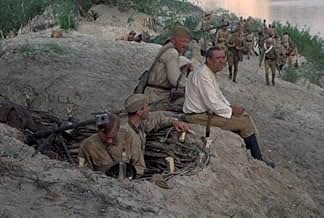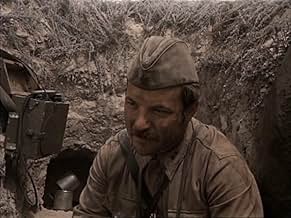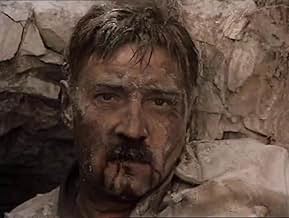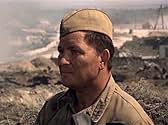CALIFICACIÓN DE IMDb
7.7/10
3.5 k
TU CALIFICACIÓN
Las tropas rusas prometen evitar que el ejército alemán tome Stalingrado.Las tropas rusas prometen evitar que el ejército alemán tome Stalingrado.Las tropas rusas prometen evitar que el ejército alemán tome Stalingrado.
- Dirección
- Guionistas
- Elenco
- Premios
- 3 nominaciones en total
Lidiya Fedoseeva-Shukshina
- Glikeriya
- (as Lidiya Fedoseeva)
- Dirección
- Guionistas
- Todo el elenco y el equipo
- Producción, taquilla y más en IMDbPro
Opiniones destacadas
I don't understand why I had never heard of this film before. It was by accident that I found it, so I gave it a whirl.
And Wow! I think you could write a novelette on what makes this a great film. There's just too much to say in a review, so I'll be general.
This war film is about Russians fighting against Germans in World War II. In ways, it is much like old American World War II films, with the spotlight on a small group of soldiers in one unit.
The director does so much that is superior that I can't even begin to start on his achievement here.
The film shows us the reality of war, including the "down time" in between conflicts, when soldiers peruse the low points.
Yet we are never bored, even when the action is supplanted by drama. The reason is that the script is so well written, and I must also congratulate whomever translated this into English for me, because its dialog would make any American film writer jealous.
One of the clever things our writer-director team does is keep the reality in the beginning by not letting us know who will survive, and who may be a central character.
Two characters dominate the story, a lady's man and a cook. However, the other characters are also spectacular.
What really makes this film work is the humor, a dark humor, but a realistic one, and one that will make you laugh and cry and the same time. When one old veteran tells the story of his trench disease, you'll laugh along with the other soldiers. It's one of those stories that is Hell when you live it, but hilarious when you tell it after the war.
For me, the magical part is something that I can't say without a spoiler.
The camera work is amazing. The drama is amazing. The theatrics is amazing. Okay, it's all amazing.
And Wow! I think you could write a novelette on what makes this a great film. There's just too much to say in a review, so I'll be general.
This war film is about Russians fighting against Germans in World War II. In ways, it is much like old American World War II films, with the spotlight on a small group of soldiers in one unit.
The director does so much that is superior that I can't even begin to start on his achievement here.
The film shows us the reality of war, including the "down time" in between conflicts, when soldiers peruse the low points.
Yet we are never bored, even when the action is supplanted by drama. The reason is that the script is so well written, and I must also congratulate whomever translated this into English for me, because its dialog would make any American film writer jealous.
One of the clever things our writer-director team does is keep the reality in the beginning by not letting us know who will survive, and who may be a central character.
Two characters dominate the story, a lady's man and a cook. However, the other characters are also spectacular.
What really makes this film work is the humor, a dark humor, but a realistic one, and one that will make you laugh and cry and the same time. When one old veteran tells the story of his trench disease, you'll laugh along with the other soldiers. It's one of those stories that is Hell when you live it, but hilarious when you tell it after the war.
For me, the magical part is something that I can't say without a spoiler.
The camera work is amazing. The drama is amazing. The theatrics is amazing. Okay, it's all amazing.
Russian production. Genre ; WW 2 drama.1975. Based on the novel by Mikhail Sholokhov.
Screenplay and direction by Sergei Bondarchuk with Vasili Shukshin ( as Poitr Lopakhin ), Vyaheslav Tikhonov ( as Nikolay Strltsov ), Sergei Bondarchuk ( as Ivan Zvyagintsev ), Georgi Burkov ( as Alexandr Kopytovskij ), Nikolai Gubenko ( as the Lieutenant ), Yuri Nikulin ( as Nekrasov ), Ivan Lapikov ( as Poprischenko ) & Nonna Mordyukova ( as Natalya Stepanova ).
The film is based on the book by Nobel Prize winning author Mikhail Sholokhov. The action is set in Russia in July of 1942. The exhausted Soviet army was in full retreat against the might of the invading German Panzer divisions. A decision is to hold a ridge with what is left of an infantry regiment near a small village on the banks of the River Don, to allow the exhausted remnants of the army enough time to withdraw across the river and help fortify Stalingrad for the decisive battle that must come.
The loss of Russian life during the campaign was horrific and while there are some impressive set battle pieces, the film concentrates on the exploits of half a dozen or so soldiers from the shattered regiment, who must not retreat even in the face of the Panzers' greater fire power. The film depicts the thoughts and fears of the individual soldiers in the face of the impending battle, and their thoughts of their Mother Russia as well.
While the battles rage, the viewer is not only shown the inhumanity of the conflict, but also the strong personal bonds that develop between comrades in arms in a deadly conflict. There is also plenty of humor in the script, even if it is often grim and tinged with violent overtones. Vasili Shukshin ( as Poitr Lopakhin ) takes the acting honors, with a character that is as much larrikin as it is proletariat.
Screenplay and direction by Sergei Bondarchuk with Vasili Shukshin ( as Poitr Lopakhin ), Vyaheslav Tikhonov ( as Nikolay Strltsov ), Sergei Bondarchuk ( as Ivan Zvyagintsev ), Georgi Burkov ( as Alexandr Kopytovskij ), Nikolai Gubenko ( as the Lieutenant ), Yuri Nikulin ( as Nekrasov ), Ivan Lapikov ( as Poprischenko ) & Nonna Mordyukova ( as Natalya Stepanova ).
The film is based on the book by Nobel Prize winning author Mikhail Sholokhov. The action is set in Russia in July of 1942. The exhausted Soviet army was in full retreat against the might of the invading German Panzer divisions. A decision is to hold a ridge with what is left of an infantry regiment near a small village on the banks of the River Don, to allow the exhausted remnants of the army enough time to withdraw across the river and help fortify Stalingrad for the decisive battle that must come.
The loss of Russian life during the campaign was horrific and while there are some impressive set battle pieces, the film concentrates on the exploits of half a dozen or so soldiers from the shattered regiment, who must not retreat even in the face of the Panzers' greater fire power. The film depicts the thoughts and fears of the individual soldiers in the face of the impending battle, and their thoughts of their Mother Russia as well.
While the battles rage, the viewer is not only shown the inhumanity of the conflict, but also the strong personal bonds that develop between comrades in arms in a deadly conflict. There is also plenty of humor in the script, even if it is often grim and tinged with violent overtones. Vasili Shukshin ( as Poitr Lopakhin ) takes the acting honors, with a character that is as much larrikin as it is proletariat.
Its 1942. The war in Russia is going badly for the Russians. They are being slowly pushed back by the ever advancing Nazis. This is the story of a regiment who's slowly dwindling numbers try to survive and remain optimistic as they continue to try to prevent the enemy from ever reaching Stalingrad.
This is a great war movie. As with all Sergei Bondarchuk films this is a movie that makes you think and feel by showing you what its like to be a lone man in a huge situation. We get to go inside the heads of the various characters and we see what its like to be in battle. The battle scenes are good as the Russian soldiers simply try to survive the strafing, the bombing and to keep the Germans far enough away that they don't have a good chance at killing them.
In someways this film reminded me of Terrence Malicks's Thin Red Line which used similar techniques at times (for example: subjective camera, manipulation of the soundtrack, disjointed flashback.) Actually this movie reminded me of several other war films produced after its release and I'm curious if film makers like Francis Ford Coppola and others studied copies of this all but impossible to see film when they made things like Apocalypse Now.
As good as the film is it isn't perfect. The film can come off as a bit too "rah rah" for mother Russia at times, even though the film ultimately speaks to the larger question of defending one's own home land. The film also is a bit unfocused in the second half as the film takes some odd turns; then again the second half has some of its most powerful imagery with the young nurse trying to save the wounded man in the bomb crater and the return of one soldier from hospital.
See this movie. Its a great great war war film which only suffers when compared to some of the gems in the Sergei Bondarchuk back catalog of films.
This is a great war movie. As with all Sergei Bondarchuk films this is a movie that makes you think and feel by showing you what its like to be a lone man in a huge situation. We get to go inside the heads of the various characters and we see what its like to be in battle. The battle scenes are good as the Russian soldiers simply try to survive the strafing, the bombing and to keep the Germans far enough away that they don't have a good chance at killing them.
In someways this film reminded me of Terrence Malicks's Thin Red Line which used similar techniques at times (for example: subjective camera, manipulation of the soundtrack, disjointed flashback.) Actually this movie reminded me of several other war films produced after its release and I'm curious if film makers like Francis Ford Coppola and others studied copies of this all but impossible to see film when they made things like Apocalypse Now.
As good as the film is it isn't perfect. The film can come off as a bit too "rah rah" for mother Russia at times, even though the film ultimately speaks to the larger question of defending one's own home land. The film also is a bit unfocused in the second half as the film takes some odd turns; then again the second half has some of its most powerful imagery with the young nurse trying to save the wounded man in the bomb crater and the return of one soldier from hospital.
See this movie. Its a great great war war film which only suffers when compared to some of the gems in the Sergei Bondarchuk back catalog of films.
Sergei Bondarchuk is a great director. He has proved it with War and Peace, with Waterloo and now again with They Fought for Their Moterhland.
The film looks great. It's amazing how Bondarchuk can translate a world to film and still make it feel very real. The production is great, except for some minor things (tank turrets don't move). When I watched this film, I got the feeling that the whole world was at war. Not only these soldiers somewhere in Russia, but that they were just small parts in a big world conflict.
Most people always complain about the acting in Russian movies. That doesn't go for this one. It all feels very natural. The pain they show looks real, their sweat is there and I cannot imagine it with other actors (or acting method). Sergei Bondarchuk himself plays a role and he shows that he cannot only direct, but also act.
What I loved the most, is that this film shows war as I think it is. There are humans, the enemy is just a dot far away and every fight there are losses. Russians and Germans bleed alike. The Soviet flag is shown and it's clear who we are supposed to root for, but the main characters aren't heroes. They fight because they are told too, not because they are tough.
The music is like the music of War and Peace; not really pleasant to listen to, but it's perfect for the film. When an act of horror is shown, voices rise as if they complain. A requiem to humanity.
They Fought for their Motherland is bit like Spielbergs Saving Private Ryan; only without the misplaced heroism and with that touch of humanity.
Maybe not for everyone (since their is a delicate balance between spectacle, humanity and of course philosophy), but when you are looking for more aspects of war than just the heroic stereotype combat, go for this.
The film looks great. It's amazing how Bondarchuk can translate a world to film and still make it feel very real. The production is great, except for some minor things (tank turrets don't move). When I watched this film, I got the feeling that the whole world was at war. Not only these soldiers somewhere in Russia, but that they were just small parts in a big world conflict.
Most people always complain about the acting in Russian movies. That doesn't go for this one. It all feels very natural. The pain they show looks real, their sweat is there and I cannot imagine it with other actors (or acting method). Sergei Bondarchuk himself plays a role and he shows that he cannot only direct, but also act.
What I loved the most, is that this film shows war as I think it is. There are humans, the enemy is just a dot far away and every fight there are losses. Russians and Germans bleed alike. The Soviet flag is shown and it's clear who we are supposed to root for, but the main characters aren't heroes. They fight because they are told too, not because they are tough.
The music is like the music of War and Peace; not really pleasant to listen to, but it's perfect for the film. When an act of horror is shown, voices rise as if they complain. A requiem to humanity.
They Fought for their Motherland is bit like Spielbergs Saving Private Ryan; only without the misplaced heroism and with that touch of humanity.
Maybe not for everyone (since their is a delicate balance between spectacle, humanity and of course philosophy), but when you are looking for more aspects of war than just the heroic stereotype combat, go for this.
A major war movie, with an intimate sight on a Soviet regiment that is fighting back invading Nazi troops while retreating. Another interesting issue that is portrayed here are their relations with local peasant people, whose feelings towards retreat are well explored by the script too. Anyway, the greatest merit of this film are the war scenes, very well done, quite realistic.
¿Sabías que…?
- TriviaThis was the last film of Vasiliy Shukshin.
- ErroresDuring the first battle, a few of the Germans are carrying MP44 (or STG 44) assault rifles. This film takes place in summer 1942 and those rifles were not in service in the German army (even as prototypes) until over two years later.
- Citas
Ivan Zvyagintsev: May our love towards our country live in our hearts as long as we live.
Ivan Zvyagintsev: May our hatred to enemy always shine on the tips of our bayonets...
- ConexionesFeatured in Sergey Bondarchuk (1982)
Selecciones populares
Inicia sesión para calificar y agrega a la lista de videos para obtener recomendaciones personalizadas
- How long is They Fought for Their Country?Con tecnología de Alexa
Detalles
Contribuir a esta página
Sugiere una edición o agrega el contenido que falta

Principales brechas de datos
By what name was Ellos lucharon por la patria (1975) officially released in Canada in English?
Responda




































